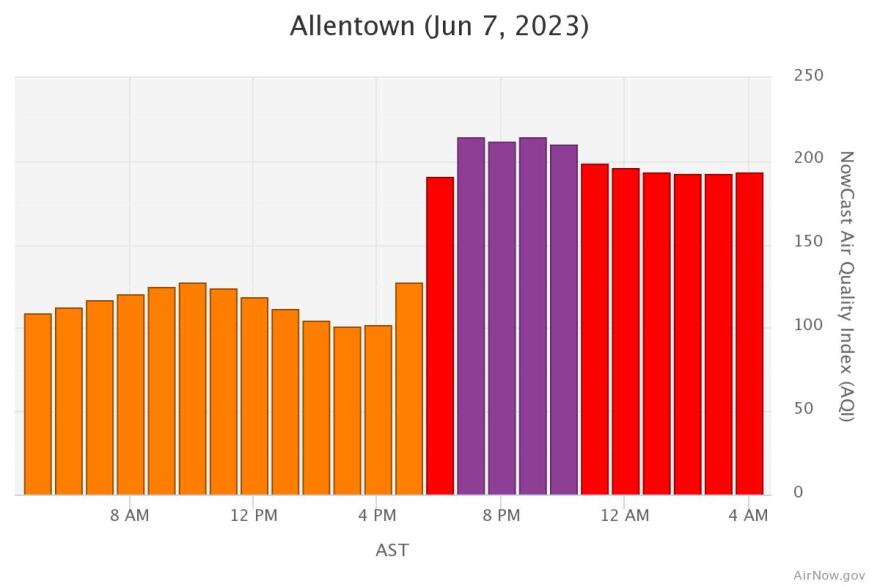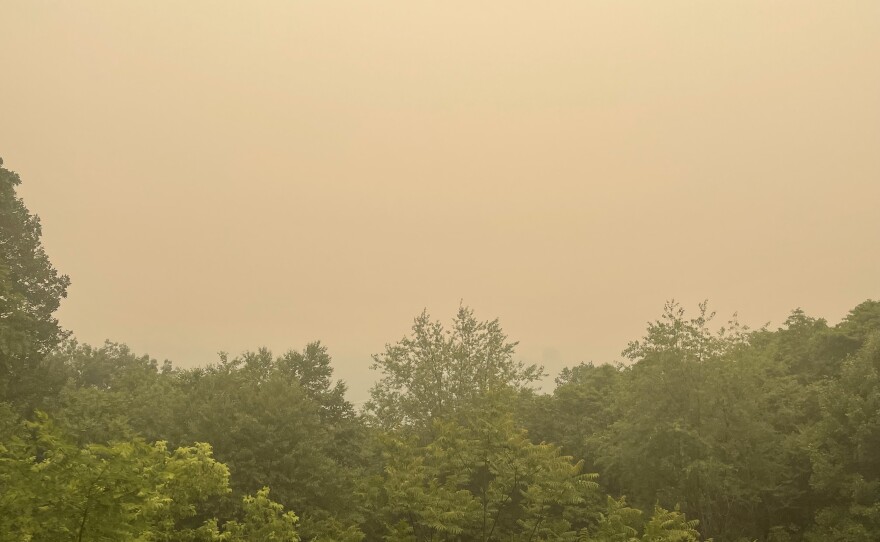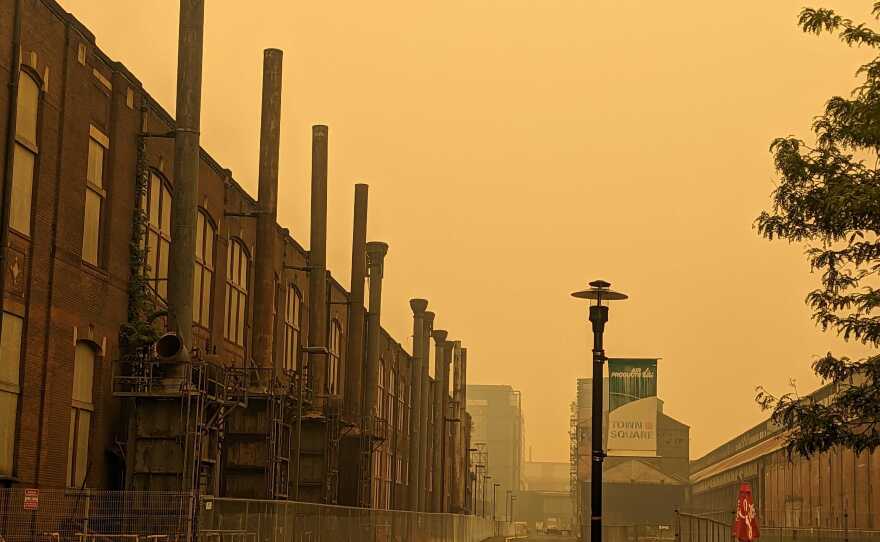BETHLEHEM, Pa. — Air quality in the Lehigh Valley became “very unhealthy” on Tuesday, rising to 215 on the Environmental Protection Agency’s Air Quality Index in Allentown, and the area is now under a code red air quality alert Wednesday.
The alert means that air quality within the region may approach or exceed unhealthy levels, as it did Tuesday.
In addition to the reading in Allentown, a permanent monitor in Bethlehem also hit 217 on Tuesday as a thick, smoky haze from Canada, where hundreds of wildfires were burning, floated over a huge part of the northeastern United States.
By comparison, the Lehigh Valley’s air quality has generally been below 50 on the index this year, in the EPA’s green, or “good” category.
With caveats applied, the numbers Tuesday came close to a record for 24-hour PM2.5 AQI for the entire EPA Allentown-Bethlehem-Easton area, and the National Weather Service said another smoke plume is expected Wednesday afternoon and evening.
Experimental smoke and haze forecast simulation: the smoke and haze is anticipated to have some improvement this morning, however an additional plume of thick smoke should spread south into the area later this afternoon and evening. Avoid time outdoors. #PAwx #NJwx #DEwx #MDwx pic.twitter.com/Qqn4z3qyqd
— NWS Mount Holly (@NWS_MountHolly) June 7, 2023
Fine particulate matter, or PM2.5, are tiny particles in the air that reduce visibility and cause the air to appear hazy when levels are elevated.
Particulate matter is a type of air pollution that can cause serious health problems, according to the DEP.
Because the particles are so small, they can easily be inhaled into our lungs, making it hard to breathe. The smaller the particle, the deeper into our lungs and bloodstream they can travel.
MORE: A live look at the conditions.
With records that only go back to 1999, and the need for the EPA to certify Tuesday's data, the values exceeded the EPA’s orange rating by 6 p.m. of air considered “unhealthy for sensitive groups.” The air was considered “very unhealthy” between 7 and 10 p.m.
According to researchers, emergency room visits can spike on really smoky days. Respiratory visits in particular go way up, as expected.

More on AQI
The EPA's Air Quality Index provides color codes for forecasting and reporting daily air quality. Green means the air quality is good; yellow means moderate; orange represents unhealthy pollution levels for sensitive groups of people; and red warns of unhealthy pollution levels for all.
The chart also uses purple and brown to represent very unhealthy and hazardous air quality.
An Air Quality Action Day is issued when the AQI is forecasted to be orange or higher, as it is again on Wednesday, when the Lehigh Valley is again expected to see its skyline obscured by hazy skies. A code orange alert was upgraded Wednesday morning to a code red.
The wildfires in Canada, and an elevated risk locally
More than 400 active wildfires were burning in Canada on Tuesday, according to the Canadian Interagency Forest Fire Center, with the wildfire season only expected to worsen.
More than 200 of the fires were burning out of control, the agency said.
Quebec was most affected by wildfires as of Tuesday night, with more than 150 active fires burning. That was the smoke that drifted into the United States and, ultimately, into the Lehigh Valley.
A combination of low relative humidity, breezy west to northwest winds, and dry fine fuels will also lead to an elevated risk for fire spread again Wednesday in our area.
Minimum relative humidity values for the afternoon are expected to range from 20-25% across the region, the weather service said in a special weather statement. West to northwest winds will increase to around 10 to 15 mph with gusts up to 20 mph possible.
Wildfires and Air Quality
Here’s how to protect yourself:
Wildfire smoke can make the outdoor air unhealthy. You should also be aware that some of the smoke from the outdoors can enter your home and make it unhealthy to breathe indoor air, too. Here are actions you can take to reduce exposure, according to the EPA:
Avoid outdoor activities and stay inside
Keep pets inside except for short bathroom breaks
Keep doors and windows closed
Wear a mask, such as an N95 respirator mask
Set your HVAC system to recirculate mode, if possible
Close outdoor dampers on window air conditioners
Avoid activities that create more fine particles indoors, such as frying food, burning candles or spraying aerosol products
Air out your home if air quality improves, even temporarily
Residents are urged to exercise caution if handling any potential ignition source, including machinery, cigarettes and matches, and to discard all smoking materials properly.
Northampton County Emergency Management Services said it continues to monitor the smoke in the county and surrounding areas.
Carbon County's Emergency Management also asked residents to "be discerning" when calling 911 to report smoke conditions, and to only call emergency services if visually observing fire or an emergency situation.







